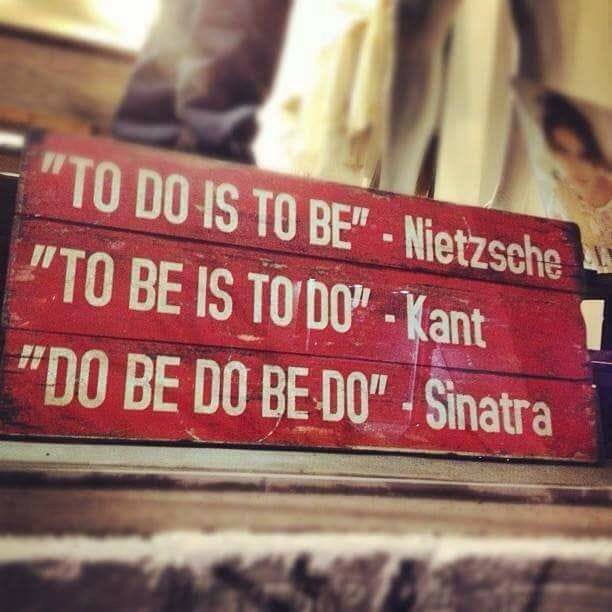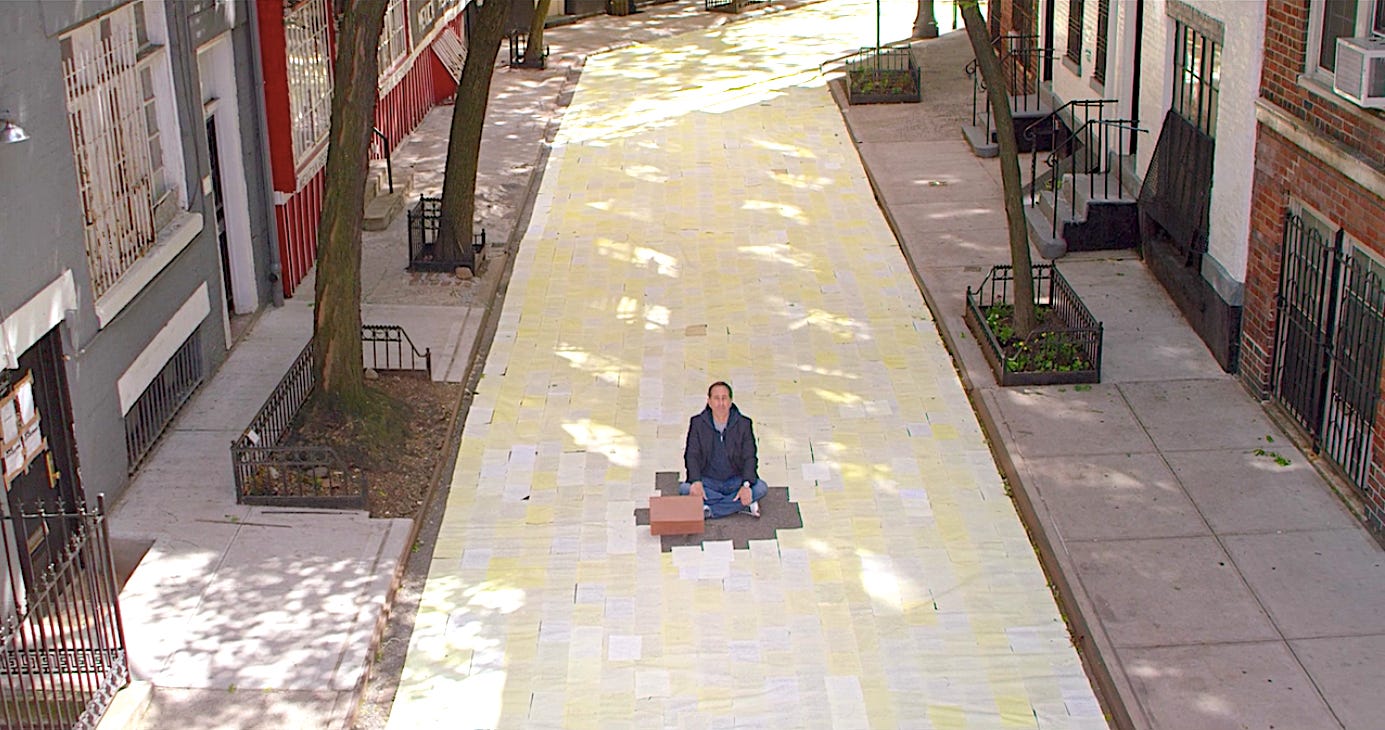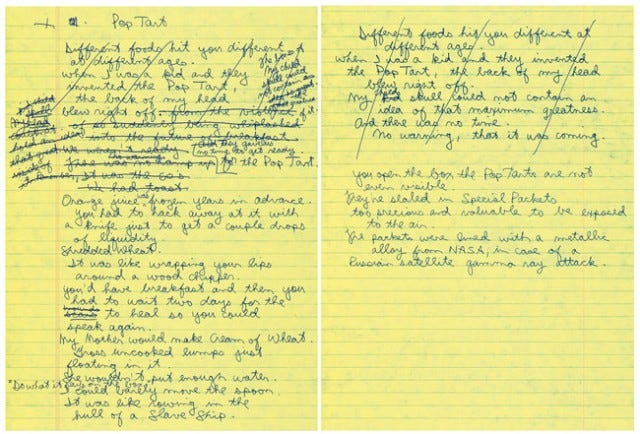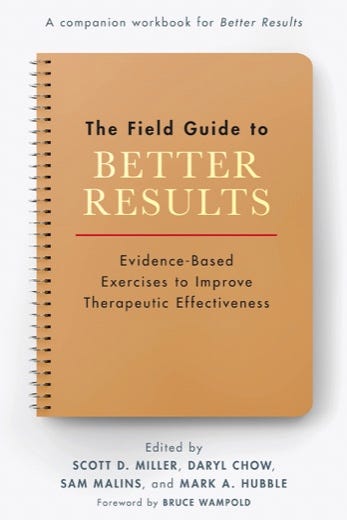Frontiers Friday #124: Humour (Part II)🤪⭕️
What therapists can learn from Seinfeld's devotion to the craft. (Plus, a special treat to the first 100 to our new book!)
Happy Friday!
Last week, I took a detour to address the topic “Can ChatGPT Replace Psychotherapy?”
This week, Frontiers Friday (FF) is back with Part II on the topic of Humour. (If you missed Part I, here it is).
📕 🙊Read: Ha!
Humour and religious views are not at odds with each other. Apologetic writer Peter Kreeft provides a doorway for all of us to learn to laugh, especially at ourselves.
Kreeft points out the etymology of the word “Humble,” which relates to “humus.” or earth. It is linked to the word “humor.”“…Humility is usually misunderstood. It’s not a low opinion of yourself; it’s no opinion of yourself.
…Sometimes proud people talk about how bad they are, and that’s a form of pride too, a dangerous one because it’s camouflaged.Jokes are both causes and effects of humility. They both foster and express humility. How? By their surprise. The secret of most jokes is the timing, the sudden “aha!” moment.
Key Grafs:
- A good joke turns us into Shakers. It makes us shake with laughter. It’s like a mental orgasm. It is a mental orgasm.
- Telling a good joke makes someone laugh, and making someone laugh is an act of charity. Therefore being a good comedian is a high and holy calling.
- We can even perform this act of charity toward God. How can you make God laugh? Just tell Him your plans.
- As Michael O’Brien says, “humor is the delight of suddenly expanded perspective. Humor is the transformation of linear vision into the multidimensional. Humor is not logical, Nor is it anti-logical. It is meta-logical.”
- Or one might say that humor is logical and shows us that we are not. But it is best to say that humor is neither logical nor illogical (i.e., less than logical) but trans-logical (more than logical). It is like love that way, and beauty, and music, and mysticism
Anytime I recommend a book vaguely linked to religious views, a part of me worries that it might get misconstrued. This is not a book about religion. If anything, it’s a book about how we live, how we relate, and the daily practice of lightening up.📽 Watch: Documentary, Jerry Seinfeld Comedian
Nearly everyone knows Seinfeld. I am recommending this particular documentary because it dispels the myths shrouded around being a top comedian—or any top performer—and the hard work involved in creating the act.
Having retired his old stand-up comedy act, the sitcom Seinfeld and his 1998 HBO special, this show documents the process of him developing an entirely new act.
This segment around the 49-min mark left a deep impression on me:You know, when I was starting out I used to sit down and write a couple times a week. And then one day I was watching these construction workers go back to work… and I was watching them kind of trudging down the street. And I was…like.. er… it was like a revelation to me, and I realised…These guys don't want to go back to work after lunch, but they're going. ‘Cause this is their job.
And I think if they can exhibit that level of dedication for that job, I should be able to do the same. Just trudge your ass in.This is particular documentary is relevant when we think about how we learn. When therapists attempt to learn from “master” therapists, oftentimes we see the result, the output, but not the input. We need more examples of not just how people perform, but how they learn.
Read: Is This Anything?
Some time ago, I was really taken by Seinfeld’s idea of a creating a daily streak.
But what exactly should I be have for my “streak”? It can’t be too many… Chase two rabbits, and you catch none.
After some deliberation, I decided that since I was a rather haphazard thinker, and that I also clarify my thinking when I put them down, I decided that I am go making writing a habit. Not binge-write, but write down my ideas, my learnings, my blunders, etc. on a fairly consistent basis (e.g., see Parameters and Samples for Capturing Weekly Therapy Learnings).
However, I had other things to juggle, like, mouths to feed. Like so many of us these days, there isn’t just “one thing” on my plate. And I wasn’t exactly aiming to be a full-time writer. I just wanted to learn better, so that I can be better as a person and as a professional.
Then I stumbled upon an app, called Beeminder. I talked about this in FF02. In short, it’s a free app that “stings me” with losing a couple of bucks, if I fall of the rail.
As opposed to paying for something, nothing stings more than losing money (i.e., loss adversion).
I’m kinda embarrassed to say this, but since Aug 2019, I’ve begrudgingly lost some money1: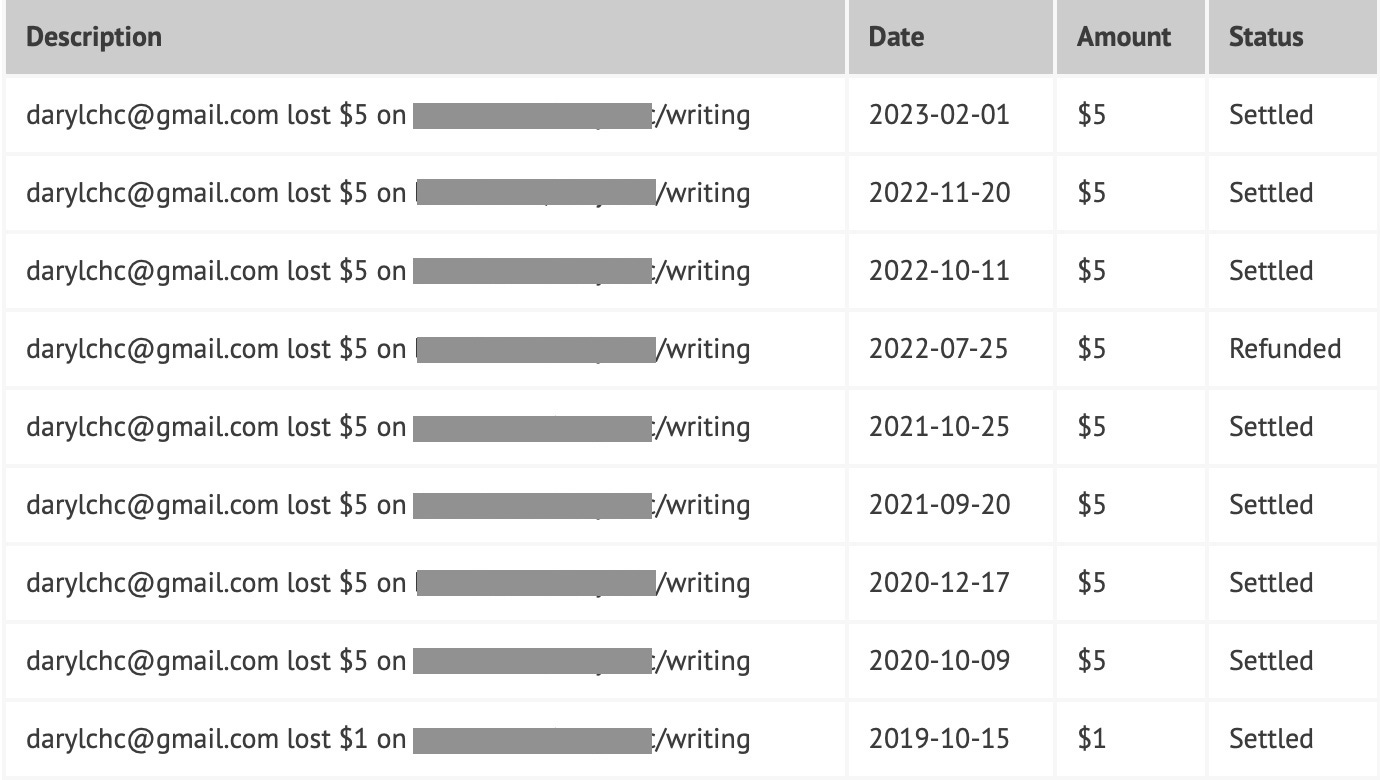
Remember, I lost money to Beeminder because I didn’t keep up with my intentions of writing consistently. The app was “free.” How perverse.
My first thought looking at these figures—for the first time actually—is, “what a perverse incentive!” But is the $41 (USD, if I may add), spent/lost worth it? My answer is a “tentative yes. “Tentative” because, I really don’t want to give Beeminder anymore money. And “yes” because, it is entirely aligned with my intentions.
Reading Seinfeld’s cumulation of jokes across 25 years, his book Is This Anything isn’t really as funny as watching him live on stage, of course. But, it really hit home from me, what it really means to be devoted to your craft.
One line, one idea, one day at a time.🎧 Listen: Interview with Jerry Seinfeld by Tim Ferriss
I’ve recommended this before in FF20.After learning more about Seinfeld, this particular long-form podcast interview with the legend was such a treat. In particular, it was humbling to learn more about his systems and routines.
Key grafs:
- When writing, treat yourself like a baby. When editing, be a hard-ass.
- Pain is knowledge rushing in to fill a void.⏸ Words Worth Contemplating:
“Comedian” is a high and holy calling because comedians make people happy. Good comedians love three things: laughter and happiness and people.
~ Peter Kreeft.
Reflection
Humility… Humus…Humour.
A graceful self-forgetting.
BIG HUGS TO NEW PEOPLE WHO ARE AT THEIR FRONTIER!
If you've just joined us, I'm glad you can join us at the "bleeding edge." Feel free to check out the back catalogue of Frontiers of Psychotherapists Development (FPD). You might also want to go into specific topics in the FPD Archives like
And if you want to see past newsletters, the entire archive is now made available in substack.
In case you missed it, see the most recent missives
Devotion to the Craft (6 Parts)
Caring for People in Organisations (3 Parts)
Clinical Supervision (3 Parts)
Feedback Informed Treatment (4 Parts)
Unintended Consequences (2 Parts)
Deep Learner (4 Parts)
Going Further with Deep Learner and The Use of Obsidian (6 Parts)
See What You Hear, Hear What You See (4 Parts)
Trauma (3 Parts)
Deliberate Practice (5 Parts)
Empathy (6 Parts)
Therapist Effects (2 Parts)
Client Point of View (4 Parts)
Tech Tools for Therapists (4 Parts)
Emotions (6 Parts)
Sensitivity (3 Parts)
Alliance (6 Parts)
Existence (6 Parts)
Play (4 Parts)
For the general public, my other blog site is called FullCircles: Reflections on Living
By the way, don't feel bad if you want to unsubscribe to this newsletter. This might not be for you. The last thing I want is to add to the anxious clutter of our inboxes. And, please excuse any typos…
Note:
These newsletter are free, but many hours are spent handpicking the curated list that make it to Frontiers Friday, as well as writing the essays and recording the videos and podcasts. Amazon affiliate links, if any, are to help ease the costs. You can also support the sustenance of this work by picking up any of the books, dive deep into our courses, or gifting them to others.
Update: Substack has added a “PLEDGE” somewhere on the page. Thanks for those who are so kind to want to support my writings. It means a great to me. Big thanks.
Daryl Chow Ph.D. is the author of The First Kiss, co-author of Better Results, and The Write to Recovery, Creating Impact, and the forthcoming book The Field Guide to Better Results (APA, 23rd of May 2023).
Psst.
Our next book is coming out soon on 23rd of May’23!
If you pre-order it now, send us the receipt.
If you are among the first 100 people to pre-order the book now, my co-authors and I will begin sending you some chapters ahead of time.
(UPDATE: The last I checked, we only have about less than 20 people left before the first 100).
You’ll also be granted access to two, live, hour-long webinars where we’ll summarize the latest findings, provide implementation tips, and address your specific questions.
To participate, simply:
Click here to pre-order The Field Guide.
(If it says “out of stock” on Amazon for folks outside US, you can either order the kindle version, or go to our publishers).Send a copy of your receipt to: info@betterresultsbook.com
Not read Better Results yet?
Not to worry. Thanks to a special arrangement with the American Psychological Association, you can order a copy at 25% off the list price – and that includes free shipping to all US locations! Just click here to visit the APA website and use the code APA25 at check out.
On my first derailment on Beeminder, I actually wrote to the company to explain my situation and asked for a refund of my $5.

